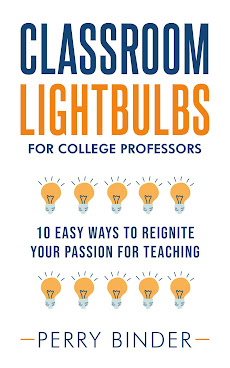I wrote this Op-Ed in 2009 for The Atlanta Journal Constitution's Education section (2009), which was reprinted in The Huffington Post (2010).
The Case for Humor in the College Classroom
c 2009-2015 Perry Binder
As college professors nationwide prepare for a new academic year, my message for them is simple: Lighten up! Your students just might engage and learn.
I never dreamed of being a college professor. Does anybody? When my third grade teacher asked us about our dream job, Molly said an astronaut; Evan, an actor. Perry: Obtain a terminal degree and lecture on legal morasses.
Whether the subject is law or nuclear physics, every student wants a good laugh. As teacher accountability objectives collide with shorter attention spans, laughter is the secret ingredient to keep everyone on task. Humor can even be found in the most stressful situations. For example, I tell students that I can't offer legal advice. But that didn't stop "Steve" from calling me after class in a panic: The judge gave me ten days for speeding; they're taking me away! So that night, I drove to the county jail, where the innkeeper ushered me into a tiny drab room facing glass. Steve appeared on the other side, looking weary and wearing an ugly orange jumpsuit. I never practiced criminal law, so I just put my hand up to the glass and spread my fingers apart because I saw that done on TV. Steve finally smiled and put his hand up to mine. He told me what happened, but all I could do was stare at our mitts and think: Hey, this TV hand thing really works!
While Steve's dilemma was no laughing matter, I use that story on the first day of class to set the tone for the semester: Understanding the law is serious business and applied unequally to funny, young college students without counsel. But we will laugh and learn a lot together.
To me, humor in the classroom mixes audience participation with storytelling about the quirky world around us. The professor and students form an improv troupe, working on the day's subject. Here are my rules of classroom engagement:
Exaggerate to Illustrate. Paint an implausible mental picture to reinforce a topic. When we study "self defense," a limping crazy man wields a lumberman's axe and approaches a student track star limbering up for a run. If the wild man is 200 feet away, does the student have a duty to retreat or can she pick up and use a submachine gun conveniently left on a park bench?
Expect the Unexpected. When a cell phone rings, the classroom rule is that I get to answer it. And when MY phone rang once, the students got to answer it. Another time, students were nervous for an exam, so I asked a student to stand up as I gave her my whiteboard marker. I then ran to the front of the classroom, back to the students, and instructed her to wing the marker at my head (missed me, wide right). One time I wore a pair of Sketchers to class but was skeptical on how they looked. I asked for student opinions by jumping on the computer console table and placing a sole on the document camera, which projected an Imax theater-size image. The original 360° Tour.
Now you might be thinking that your college won't let profs be jailhouse lawyers, encourage students to fling objects, or stand on expensive technology. That's not the point. The most important rule is to always be yourself in the classroom. You don't need to have a funny bone; the world around us is a gold mine of material. Consider this recent headline, Man pleads guilty to DUI in Motorized Recliner. If the law is funny, so is any subject and thus, an opportunity to humor up classrooms.
Postscript. I referred Steve to a criminal defense lawyer but my student still spent three days in jail for speeding. It would've been zero if he had an attorney at the outset, which shows that maybe nothing is funny about the law after all.









.jpg)